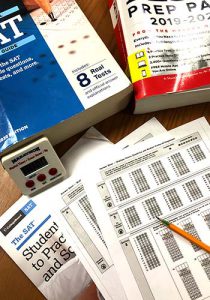 Though there is no official definition, a Tier 1 college is basically one that is highly competitive or fairly difficult to gain acceptance. Because the coursework tends to be quite rigorous, these schools accept only the strongest students who typically graduate no less than in the top 20 percent of their class.
Though there is no official definition, a Tier 1 college is basically one that is highly competitive or fairly difficult to gain acceptance. Because the coursework tends to be quite rigorous, these schools accept only the strongest students who typically graduate no less than in the top 20 percent of their class.
Tier 1 colleges have a strong reputation and brand name. For instance, the University of Texas and Texas A&M University are two nationally known Tier 1 colleges in Texas. Service academies, such as the United States Military Academy at West Point and United States Naval Academy, also fall into the Tier 1 category.
Prepare Your Teen For a Tier 1 College
Below are five questions that can help you determine whether or not your teen is on track for a Tier 1 college.
1) Is your teenager taking Advanced Placement classes?
Preparation for a Tier 1 college begins early, particularly in the 8th grade. It is important for your student to take Pre-AP classes so he or she will eventually take AP classes.
If your child is a freshman or sophomore, he or she should already be taking Pre-AP or, even better, AP classes. If your teen is not, then speak with the guidance counselor to change his or her high school degree plan. Pre-AP and AP classes are more difficult than regular classes, but they will prepare your child for the rigor of college.
If your teenager is struggling in an AP class, he or she needs to finish the class and not go back to a regular class. In nearly every high school, AP classes are weighted more than regular classes. For instance, if your son makes a “C” in an AP class, he will earn the same GPA points as the student who earned a “B” in a regular class.
Also, take advantage of the summer school program at your child’s high school. Summer is the time for your child to either catch up in a certain course or, better yet, get ahead.
2) Is your teen making high grades?
Passing college-preparatory classes is not enough. Tier 1 colleges want students who excel in these classes. Your teen
should try to make an “A” or “B” in every class and never settle for the “C.” To an admissions counselor, a grade does not necessarily reflect intellect, it reflects effort. Top grades do not guarantee acceptance, but average or low grades ensure rejection.
If your son or daughter is struggling to make an “A” or “B”, ask the guidance counselor to arrange tutoring with the teacher. If that fails, then hire a tutor to help your child. If you cannot invest in a tutor, find a friend, family member or colleague who can help.
3) Is your teenager involved in an extra-curricular activity and performing community service?
Tier 1 colleges do not just look for smart students, they look for well-rounded students. They want students whose application stands out in every area: academics, extra-curricular activities and community service.
If your teen is not already involved with a club or organization at school, then have a talk about his or her interests. Then speak with the guidance counselor to find out what clubs or organization your child should join. Also, ask your son or daughter to choose a non-profit organization where he or she will enjoy helping. For example, if your daughter likes animals, she should assist at an animal shelter.
4) Is your teen a student leader?
Tier 1 colleges receive thousands of applications from “good” students. What these colleges really want are overachievers who show great potential. If your student is already involved with a sport, club or organization at school, encourage them to seek a leadership position and enter competitions. Positions, awards and any other achievements will shine on an application.
5) Does your teenager know what he or she wants to do in life?
Teens need to have an idea of what they wish to study in college. Tier 1 colleges prefer applicants who already have a career goal and direction in life.
It is also important for teenagers to take the high school courses that will help them succeed in their field. For instance, if your son wishes to become a pilot, he must take advanced math and science courses.
By the 11th grade, your student should be researching the best colleges for his or her major. This will allow your child to plan college visits in the summer. By the start of the 12th grade, your teen should have a good idea of which colleges he or she should apply to.
Keep an Open Mind
Your son or daughter should apply to at least a few Tier 1 colleges and even a Tier 2 college. This strategy is not just to give your child “back-ups,” it is to give them options.
For example, even if your child gets accepted into the Tier 1 college of his or her choice, another Tier 1 college may offer a better financial aid package.
Also, do not be too disappointed if your child chooses to attend a Tier 2 college. Often times, Tier 2 colleges offer better scholarship or financial aid packages as well as more personalized instruction. In fact, the programs in many Tier 2 colleges are comparable if not better than some Tier 1 colleges.
In the end, what is most important is that your child is academically prepared for college and receiving the education he or she needs to pursue his or her career goals.
Educational Alternatives
If you believe your teen is not on the college track, and you have already exhausted the public school system, you may need to consider the educational alternatives. Private day schools or boarding schools typically provide a more structured and focused learning environment.
Marine Military Academy , for example, is a college-preparatory boarding school for young men in grades 8-12. It specializes in turning around boys who are underperforming and putting them on the path to college and lifetime success.
Stay Involved!
Student success and Tier 1 acceptance is greatly connected to parental involvement. Stay involved in your child’s education to make a Tier 1 college a reality!
Authors: Harold Compton & Andi Atkinson
Marine Military Academy is a college-preparatory boarding school for young men in grades 8-12 with an optional post-graduate year. For more information, visit MMA-TX.org.



